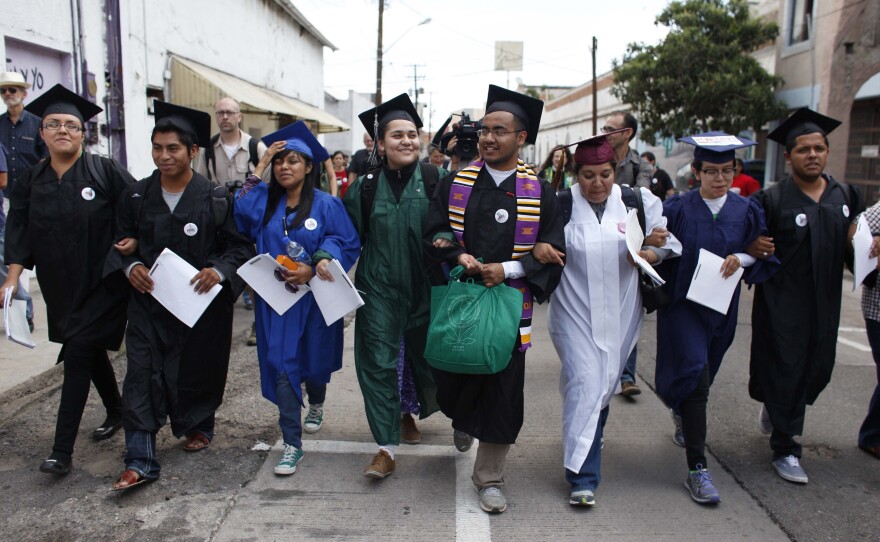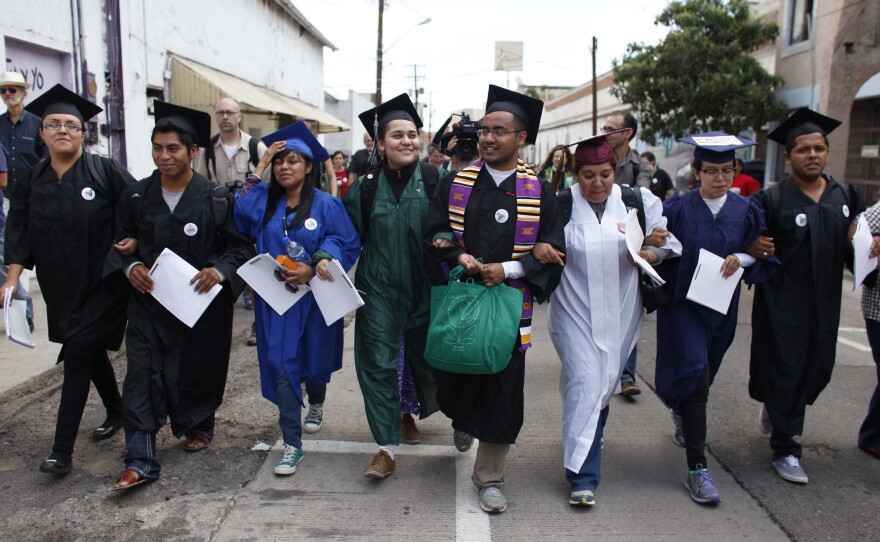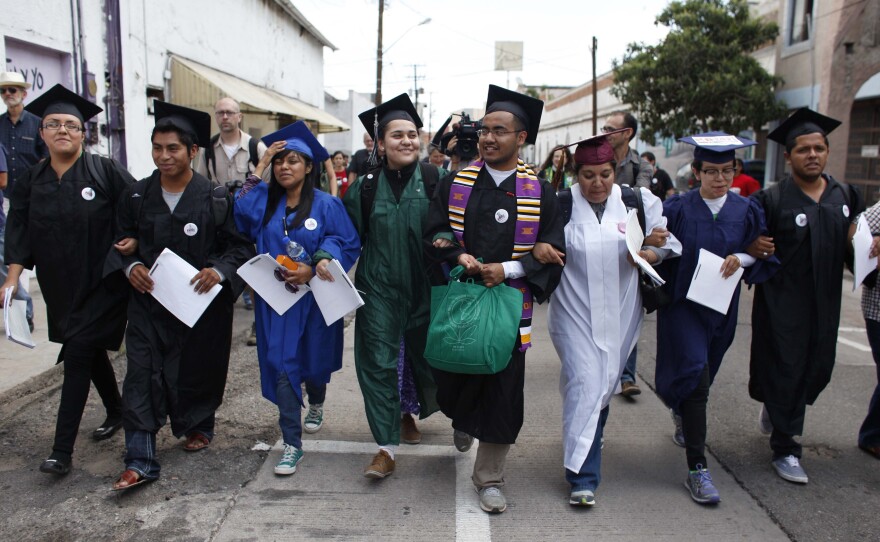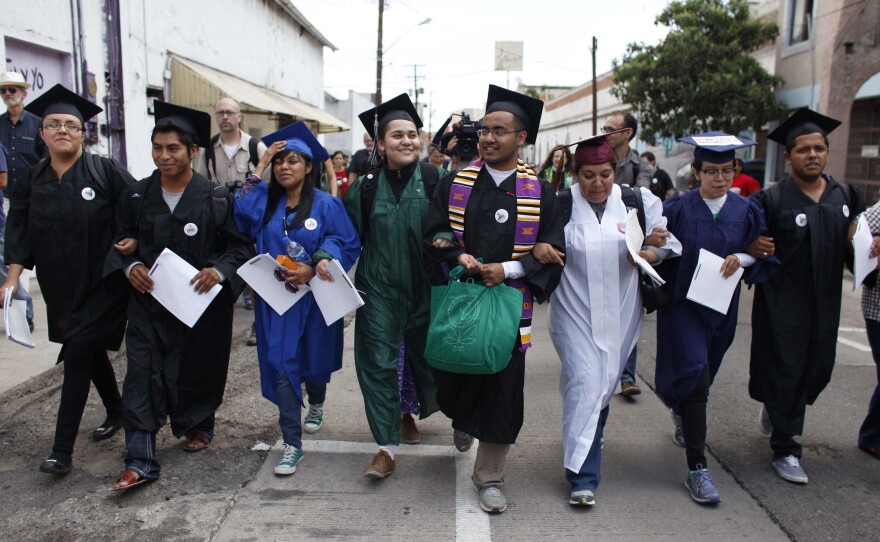


The national conversation around immigration has shifted dramatically over the past decade. That's in large part because of activists who have pushed to change the narrative around the undocumented.
"If you asked your typical soccer mom what she thought of an unauthorized immigrant, she says, 'Well, I think of Mexicans running across the border on Fox News,' " said Tamar Jacoby, who runs ImmigrationWorks USA, a think tank that advocates for changes to immigration law. Back in the mid-aughts, people pushing for an overhaul of immigration laws held large-scale rallies that Jacoby said probably turned off lots of Republican voters.
(Jacoby is herself a Republican. "That's why I want them to fix it -- not because we're going to get credit for fixing it, but because we want to be able to talk to [Latino voters] about other stuff," she says.)
Now, Jacoby says, many people think of undocumented young people much more sympathetically as hard-working, high-school-valedictorian types who can't get financial aid for college because of their lack of official status. Not coincidentally, she said, the push to overhaul immigration laws that was moribund just a decade ago has the kind of momentum that suggests some kind of reform might well happen.
(You can hear this shift even in the criticism of immigration reform. Consider Iowa Rep. Steve King's attempt to block what he considers amnesty by nudging the characterization of unauthorized young people back in the other, older direction: "For every one who's a valedictorian, there's another 100 out there [who] weigh 130 pounds and they've got calves the size of cantaloupes because they're hauling 75 pounds of marijuana across the desert.")
A lot of that shift is due to the "dreamers," the young people who have campaigned and organized around the DREAM Act. The proposed legislation would create a pathway for citizenship for potentially millions of young people who were brought to the U.S. as small children; they're culturally American but don't have the benefits that come with legal status or citizenship, like the ability to work or apply for financial aid for college. The dreamers have enjoyed broad public support; President Obama even obliquely referenced them in his second presidential acceptance speech.
But Jacoby says that support for the dreamers "might change if people start to think of DREAMers as activists" -- that is, as agitators as opposed to ideal youth.
All of which brings us to the Dream 9. They're a group of Mexican nationals raised in the U.S. who self-deported to Mexico. Once on the Mexican side, they attempted to re-enter the U.S. by seeking political asylum. They were taken into custody by authorities and, once detained, staged a hunger strike to draw attention to their cause. They say goals were two-fold: to draw attention to the limbo that young people like them are stuck in and to bring fresh scrutiny to the Obama administration's steady stream of deportations. (The nine were eventually granted release from detention and will await a decision from a judge on their asylum petitions, a process that could take years.)
But their actions have stirred criticism from allies and political opponents alike. A growing number of critics say their approach is counterproductive to their goals, if not outright dangerous.
"What we ought to be talking ... about is the politics in the House and the Republican Party," David Leopold, an immigration attorney and former president of the American Immigration Lawyers Association, told PRI. Leopold said he supports the Dream 9, if not their approach. "But instead our focus is on this action, so it pulls away attention from the big issue, which is fixing the system so 11 million can get out of the shadows."
Leopold pointed to the practical risks of following in the Dream 9's footsteps: Once you've left the U.S., it's very hard to get back in if you don't have the proper documentation.
Any other people attempting to mimic the nine aren't likely to be as lucky because asylum claims are a long shot.
As Muzaffar Chishti of the Migration Policy Institute told me last week, only 29 percent of asylum claims are granted each year, but the number of petitions granted to people from Mexico is even smaller -- just 2 percent.
"The odds against [asylum petitioners] succeeding are kind of high," Chishti said. "But [the Dream 9] are now kind of celebrities. They were clearly given extra consideration in their 'credible fear' determination."
Even Luis Gutierrez, a congressman from Illinois who has been an outspoken supporter of efforts to overhaul immigration laws, said he disagreed with the 9's tactics. "I do not agree with the actions taken by the Dream 9 because current immigration law is not on their side," he told the Daily Beast. One of Gutierrez's aides said that the Dream 9's most vocal backers are hard-liners who are opposed to compromising on any immigration legislation.
Gutierrez is an unlikely critic: He was arrested in 2010 and 2011 for protesting the Obama administration's policies toward unauthorized immigrants, and he enjoys significant street cred on immigration. So if Gutierrez wasn't totally on board, might the Dream 9 have overstepped?
Or you could ask another question altogether: Aren't activists kind of supposed to upset the apple cart? I asked Kelly Cogswell, an organizer with the Lesbian Avengers, which performed direct-action events that used to rankle less radical LGBTQ organizations. "As soon as you start to make any positive progress, you get people from the center saying, 'Tone it down, we're making progress!' " she says. "It's hard to keep pushing when you have your allies attacking you." But, she adds, political movements are messy and disorganized with lots of different voices and players.
"I don't think it hurts [the compromisers] to have more people out there who are more radical," Cogswell says. "I think it gives them more room to maneuver."
In other words, the compromisers get to compromise from further ahead when the conversations start further from the baseline status quo. "After a while, it's not about going too far, but about going along in the right direction," she says, adding that any broad political effort needs lots of people trying different approaches. (With some historical distance, we tend to think of the civil rights movement as a unified front and not as a host of different groups with different tactics who often bristled at and beefed with each other.)
That was an idea echoed by Jacoby, who compared the push for immigration changes to a concert orchestra. The Dream 9, she says, is "kind of like the guy coming in with the triangle" -- a small but essential part of the larger effort. "My view is that we need a little bit of everything -- in limits."
"If the whole debate had the tenor of the Dream 9, I'd be worried."
Copyright 2013 NPR. To see more, visit www.npr.org.






